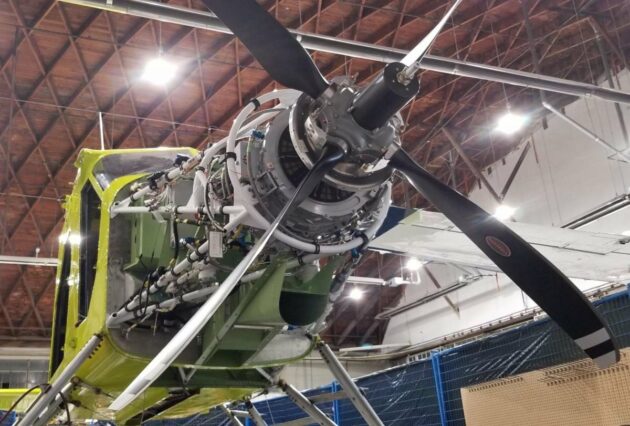
Update for 3:20 p.m. PT Dec. 8: The first test flight of Harbour Air’s electric-powered seaplane is currently scheduled for Dec. 10 rather than Dec. 11, based on an assessment of the weather around Vancouver, B.C.
Previously (with updates): Two Pacific Northwest aviation ventures — the Harbour Air seaplane airline in Vancouver, B.C., and the MagniX electric propulsion company in Redmond, Wash. — are ready to start flight tests of an all-electric passenger airplane. And those first tests are due to be live-streamed via Twitter.
That first flight of a converted de Havilland Beaver seaplane is set to take place on the Fraser River, at Harbour Air’s Richmond terminal, next to Vancouver International Airport’s south terminal. The updated target date is Dec. 10, but under the terms of Transport Canada’s permit, the timing for the test is dependent on weather and subject to change.
Harbour Air’s CEO, Greg McDougall, will take the first test flight.
“I’ve been convinced for some period of time that the future of transportation in general, and certainly aviation, is electrified,” McDougall said in a preflight video.
The plan calls for McDougall to head out from Harbour Air’s dock onto the river, fly a straight-line route westward and back, then touch down again on the river. “I’m going to guess it’ll be a five- to seven-minute flight at the most,” MagniX CEO Roei Ganzarski told GeekWire.
Updates about the timing, and about the live stream, will be posted on the two companies’ Twitter accounts.
All-electric airplanes have taken to the air before: Past flights range from the globe-girdling odyssey of Solar Impulse 2 in 2015-2016 to demonstrations of VTOL aircraft such as Airbus’ Vahana, Boeing’s passenger air vehicle, Lift Aircraft’s Hexa, China’s Ehang and many others.
But MagniX and Harbour Air are billing their converted Beaver as the “world’s first commercial all-electric airplane,” based on the fact that the companies plan to have the plane certified for passenger service by the end of 2021.
Toward that end, representatives of the Federal Aviation Administration and Transport Canada Civil Aviation will be on hand for the flight tests. Regulators will be asked to certify MagniX’s 750-horsepower Magni500 electric motor as well as the fully integrated all-electric Beaver.
Ganzarski said that the conversion has gone smoothly at Harbour Air’s hangar, and that the Magni500 has been run at full power on the ground for as long as 15 hours without a hiccup. “When you stand in that hangar next to the aircraft, and you see that motor turning the propeller, no one can hear anything — because there’s no noise,” he said.
“It’s all coming together,” Ganzarski said. “This is going to be, I think, one of the most exciting events happening in aerospace in a long time, because not only is it the first flight of a truly commercial-purpose aircraft. … This is going to be the flight that, three years from now, we look back on and say, ‘That’s what launched the third era of aviation, the electric era.’ ”
Ganzarski said the first commercial flights will last no more than 30 minutes, due to the limitations of battery capacity. That should be enough to fly the majority of Harbour Air’s routes — say, from Vancouver to Nanaimo, B.C. Eventually, Ganzarski expects battery technology, based either on lithium-ion cells or a next-generation formulation such as lithium-sulfur, to improve to the point that Harbour Air’s entire fleet could go all-electric.
And Harbour Air is just the start: Magnix and Seattle-based AeroTEC are retrofitting a Cessna Caravan 208B airplane for electric propulsion at Moses Lake’s airport in Central Washington, with the aim of starting flight tests by early 2020. Getting that plane certified should widen the options for future all-electric conversions.

AeroTEC is also working with MagniX and Israel-based Eviation on the development and testing of Eviation’s built-from-scratch Alice electric airplane. An Alice prototype was exhibited this summer at the Paris Air Show, and Ganzarski said that plane is now being prepared for runway taxi tests in Arizona. Eventually, that plane and a flight-ready version will take shape in Moses Lake, with the first test flights planned for mid-2020. Eviation is aiming to win FAA certification for Alice by early 2022.
Both MagniX and Eviation are owned by the Singapore-based Clermont Group, and Ganzarski serves as Eviation’s chairman as well as MagniX’s CEO. Those dual roles give him a wider-than-usual perspective on the electric era of aviation.
“Electric aviation not only is real, but has the potential to change operations on multiple levels of the bottom line,” he said. “Like reducing the operating cost per hour by 50, 60, 80 percent. That’s an immediate impact on an operator’s bottom line. It’s an immediate impact on their ability to offer lower prices to their passengers, or their cargo customers.”
The bigger bottom line has to do with the fact that there are zero emissions.
“People are starting to notice the impact of aviation today on climate change, the fact that in the United States you have 12% of CO2 and greenhouse gases attributed to aircraft,” Ganzarski said. “From that perspective, when you can grow your airline, grow your aviation business, provide more flights, and do it all with zero negative impact on the environment — that, of course, is something that’s very enticing for operators. So the level of interest is significant.”
And he expects the interest to grow even faster, once people see Harbour Air’s all-electric Beaver taking off.



